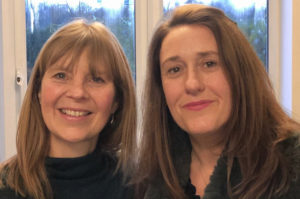Anne Lacey restarted her career after a career break to join Horizon Construction. Anne talks about her career path from the age of 16 to become a qualified Quantity Surveyor and her experiences as a woman in construction.
What made you choose a career as a quantity surveyor?
I have always been interested in maths, finance and law, and I became aware of quantity surveying through a member of my family at the age of 16. The role in construction attracted me because it seemed a little different to ‘the normal’ as a career, especially as a female. I finally chose to pursue this challenge over a career in a legal profession. Therefore, in a traditionally male-dominated construction industry, I was prepared to try to break down some barriers.
How did you become a qualified quantity surveyor?
I was accepted onto an apprenticeship scheme at the Chartered Surveyor Trainee Trust (CSTT) – a division of RICS. It started with a two-year college course and later became a higher-level certificate at London Southbank. My qualification was subsequently converted to a Quantity Surveyor (QS) degree at Anglia Ruskin University.
In total, I spent seven years in the apprenticeship scheme. I was also working in London for four days a week. Other qualifications, as part of my employment, included NVQ L3 and L4 in Surveying Property and Maintenance.
What were the challenges, considerations, and benefits of your training?
One of the challenges I faced was choosing to undertake my apprenticeship in London instead of finding somewhere more local to friends and family in Suffolk. However, commuting to London did have many advantages, including the RICS headquarters and exposure to the wide variety of construction works. Therefore, perhaps, needless to say, my career started with a lot of commuting from Suffolk. This added to the stress of education and my career.
A key benefit of my training was that the entire apprenticeship was fully funded. Part of the apprenticeship was paid for by my employer and the rest was supported by CSTT. As a 16-year-old, the financial reward of a salary was incredible. At that time, I did feel I was in the right location to experience the world of construction and to become a quantity surveyor. I also very much enjoyed putting my training and experience into practice.
In your experience, how has the industry changed towards women in construction since you began your career?
When I started my career, I was the only woman on my course, so noticeably I stood out. Starting my career as early as 16 years of age, very few people knew my capabilities and aspirations, so for many years, I felt very pressured to prove myself to others. However, this made me stronger in all areas. I became top of the class and was recognised by accomplishment awards. In retrospect, I’m not sure I would be as successful if not for the pressure.
The industry has come a long way since I started. There are now many more opportunities for women to enter or re-enter the industry. I did decide to take a sidestep from construction into property (working for an estate agency) for a while which helped when I started a family.
Can the industry provide more support to women in a career as a quantity surveyor?
Yes, I believe much more support could be offered to women so they do not leave their careers, as well as have the ability to return to their careers following a career break. There is perhaps a perception that a woman can have a career up to when they have children. The construction industry would benefit from a better understanding of the rebalancing of parental responsibilities for both women and men. More flexibility should be given to fathers to allow mothers to restart or maintain their careers.
Re-entering a career can also be daunting for women for many reasons, especially when returning on a part-time basis. Construction projects are more difficult to operate when working part-time within a traditional environment. Therefore, employers could offer more support around modern working methods and practices, such as flexible working, remote working and job sharing. The construction industry could learn from other industries which are more advanced in supporting the careers of women. Other industries have proven that adverse and inclusive workforces are more successful. Part of achieving this within the construction industry is ensuring women can achieve higher-profile roles.
How will your new position at Horizon Construction help support your career aspirations?
Horizon Construction has enabled me to return to my career. I am now a Quantity Surveyor within a busy and enjoyable department. Without this role, I believe I would have struggled to return to the career I love.
The family-like culture at Horizon Construction has supported my transition back to work. My new colleagues have also been extremely welcoming and supportive.
I am excited about my future and plan to progress in my role and responsibilities. I will be supporting others in their training and hope to welcome further female quantity surveyors to the construction group.
What advice would you give to women contemplating a career as a quantity surveyor?
My advice to women is:
- Start your training as early in life as possible and try to complete training before taking any career breaks.
- Becoming a quantity surveyor gives you a very good understanding of the construction industry. It provides you with a lifelong career, not just a job. It is an ever-changing role with new methods of construction, especially as new approaches to sustainability appear every day. Even the way we commercially manage a project is adaptive through leaps and bounds in technology.
- The skillset you build is never lost if you wish to change roles. Construction is a flexible industry and skills as a quantity surveyor are transferable into other areas, such as project management, contracts management, contract dispute resolution, and estimating. The financial management skills you learn are invaluable.




